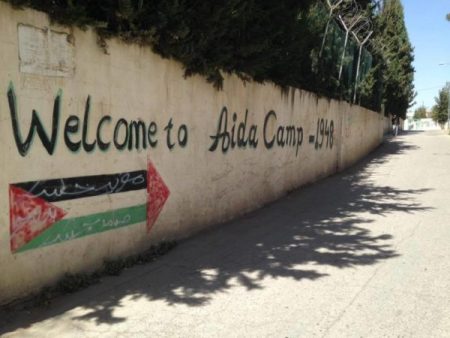by Elise Schroons- Bethlehem, PNN
The recently opened coffee shop named Aida, in Aida refugee camp, Bethlehem, welcomes customers for a coffee and a chat. Its name ‘Aida’ originates from a popular coffee shop of the same name that was located nearby. It was owned by Aida, a Palestinian woman, whose story of helping refugees, fleeing from their homes following the occupation of Zionist paramilitary in 1948, inspires the Aida residents.
“The idea was to name the coffee shop after a woman called Aida, who owned a popular coffee shop herself, in Bethlehem, in the forties. She sold coffee next to – what we now call – the Aida refugee camp,” says Akram Al Warah, the owner of the coffee shop Aida.
“When the refugees from western Jerusalem and western Hebron arrived in the area, in 1948, they had nothing on them except for some clothes in a bag and their key to their home in their hand. While the refugees were waiting and longing to go home again, Aida would welcome them in her small coffee shop with tea and coffee and provided them with food and blankets,” Akram continues.
The coffee shop opened its doors in July 2019, 71 years after Aida served her first cup of coffee for the refugees. “With our coffee shop, that carries Aida’s name, we want to keep her spirit alive and remember her generosity and nobility. I believe it will give us good luck,” the owner says.
Back in the day, Aida was of great importance for the refugees because of her help and compassion. However, her story is still important today. “By telling Aida’s story we can remind the new generation of what has happened in the past. We want them to remember the history of their homeland,” says Hussnie Al Warah, the brother of Akram and a barista at the coffee shop.


The Aida coffee shop is a popular place to meet, for local Palestinians as well as for tourists. “Not only locals from the camp come here to drink coffee and meet with their friends. Tourists visit the shop too. They like the interior and the vibe of the café,” says Hussnie. “We want to create that same sense of home, welcoming and acceptance that Aida’s coffee shop used to give to the generations before us,” adds Akram.
The interior of the Aida coffee shop tries to reflect the Palestinian culture and past. “We used antique furniture and ornaments such as an old suitcase, television and radio to revive the past. Additionally, we added a lot of plants and local art. The decoration is similar to how the Palestinian people used to decorate their houses,” according to the barista.



 Hussnie Al Warah, barista at the Aida coffee shop
Hussnie Al Warah, barista at the Aida coffee shop
Through the coffee shop, the owner supports the community and the new generation Palestinian artists, thinkers and activists. “With every cup of tea or coffee you purchase, you offer a helping hand. We dedicate 20 percent of our monthly profits to the Aida Youth Center to encourage making music, art and film for the children of Aida Camp,” concludes Akram.
(edited for the IMEMC by c h r i s @ i m e m c . o r g)
Human Interest 09/14/19 Israeli Apartheid in Masafer Yatta: Raids, Demolitions, Arrests and Beatings

